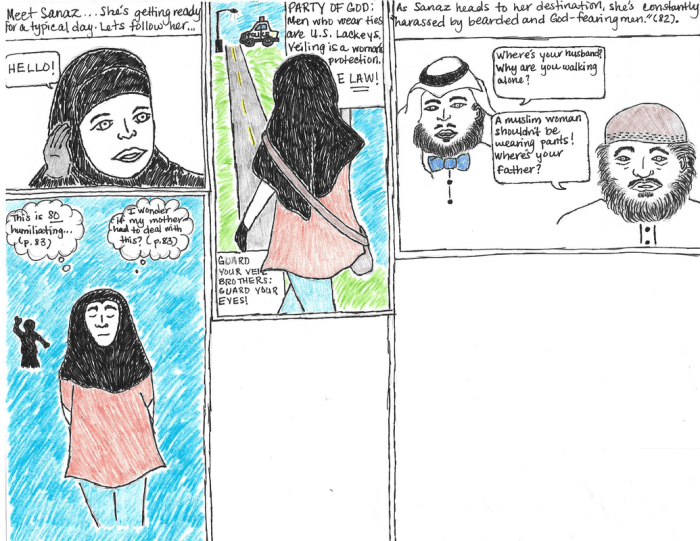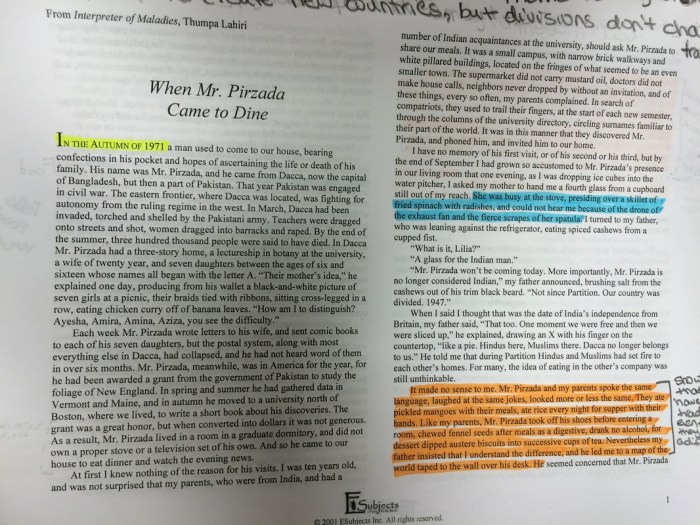When Mr. Pirzada Came to Dine sets the stage for this enthralling narrative, offering readers a glimpse into a story that is rich in detail and brimming with originality from the outset.
This novel explores the complexities of cultural exchange and understanding through the arrival of Mr. Pirzada, a Pakistani immigrant, into a small American town. As Mr. Pirzada shares his stories and experiences, he challenges traditional notions of identity and fosters empathy among the characters, ultimately transforming their perspectives and relationships.
Cultural Exchange and Understanding

In Mr. Pirzada Came to Dine, cultural exchange and understanding play a pivotal role in shaping the characters’ perspectives and relationships. Mr. Pirzada’s arrival in the American town serves as a catalyst for cultural exchange, fostering greater understanding between the Pakistani immigrant and his American hosts.
One significant aspect of this exchange is the sharing of culinary traditions. As Mr. Pirzada introduces the Ahmed family to Pakistani cuisine, they learn to appreciate the flavors and aromas of a different culture. This culinary exploration not only provides a taste of Pakistan but also serves as a bridge between the two cultures, breaking down barriers and creating a sense of connection.
The Impact of Cultural Differences
While cultural exchange fosters understanding, it also highlights the differences between the characters. The novel explores the challenges that arise from cultural differences, such as the Ahmed family’s initial hesitation towards Mr. Pirzada due to his Muslim faith. However, through open dialogue and a willingness to learn from each other, these differences gradually become a source of curiosity and respect.
- The novel demonstrates that cultural exchange and understanding are essential for building bridges between different communities. It highlights the importance of embracing diversity and seeking common ground, even in the face of cultural differences.
- By fostering cultural exchange, individuals can gain a deeper appreciation for different perspectives and ways of life, leading to greater tolerance and empathy.
- The novel also cautions against the dangers of cultural misunderstandings and prejudices, emphasizing the need for open communication and a willingness to learn from each other.
The Power of Storytelling

Storytelling plays a pivotal role in the novel “Mr. Pirzada Came to Dine,” weaving a tapestry of experiences that illuminate the characters and their journeys. Through the enchanting tales spun by Mr. Pirzada, the narrative unfolds, revealing the complexities of human nature and the transformative power of shared stories.
Mr. Pirzada’s Stories and Narrative Development
Mr. Pirzada’s stories, rooted in his rich Pakistani heritage, serve as a catalyst for character development. They transport the reader to a world beyond the confines of the dinner table, evoking vivid imagery and emotions. Each story becomes a portal through which the characters confront their own pasts, grapple with present challenges, and envision a hopeful future.
Storytelling and Character Understanding, When mr. pirzada came to dine
The stories told by Mr. Pirzada offer a window into the inner lives of the characters. They reveal their hidden fears, unspoken desires, and the complexities of their relationships. By listening to these tales, the reader gains a deeper understanding of the characters’ motivations, their struggles, and their resilience.
Storytelling and Reader’s Understanding
Through the power of storytelling, the novel invites the reader to engage with the characters on a profound level. The stories challenge preconceived notions, foster empathy, and encourage readers to reflect on their own experiences. By immersing themselves in the world of “Mr.
Pirzada Came to Dine,” readers gain a nuanced understanding of the human condition and the importance of embracing different perspectives.
The Importance of Empathy

Empathy plays a pivotal role in the novel, fostering understanding and transformation among its characters. Mr. Pirzada’s presence acts as a catalyst, encouraging empathy and bridging cultural divides.
Empathy’s Encouraging Effects
- Mr. Pirzada’s vulnerability and resilience evoke sympathy from the Pakistani community, fostering a sense of unity and compassion.
- His presence challenges the prejudices of the American characters, leading them to question their assumptions and recognize the shared humanity that transcends cultural differences.
- The characters’ interactions with Mr. Pirzada facilitate a deeper understanding of the complexities of his culture, fostering respect and appreciation for its richness.
The Complexity of Identity: When Mr. Pirzada Came To Dine

In Mr. Pirzada Came to Dine, the concept of identity is explored through the complex experiences and interactions of the characters. The novel challenges traditional notions of identity, highlighting the multifaceted and fluid nature of self.
Mr. Pirzada’s visit sparked a realization that history can be as close as the people we share our lives with. For those seeking to delve deeper into the tapestry of US history, gateway to us history answers offers a comprehensive resource, bridging the past and present with stories like Mr.
Pirzada’s.
Mr. Pirzada’s Presence and Identity Challenges
The arrival of Mr. Pirzada, a Muslim immigrant from Pakistan, disrupts the established social order of the small American town. His presence forces the characters to confront their own assumptions and prejudices about race, religion, and nationality. Through his interactions with the family, Mr.
Pirzada challenges their preconceived notions of what it means to be American, Muslim, or Pakistani.
Identity Shaped by Experiences and Interactions
The characters’ identities are not static but are constantly shaped by their experiences and interactions with others. For example, Lilia’s understanding of her Pakistani heritage evolves as she learns more about Mr. Pirzada’s culture and traditions. Similarly, the town’s residents gradually come to see Mr.
Pirzada not as an outsider but as a valued member of their community.
The Search for Belonging

In the novel “Mr. Pirzada Came to Dine,” the theme of belonging is explored through the experiences of the characters as they navigate their identities and relationships in a changing world. Mr. Pirzada’s presence as an outsider challenges the characters’ preconceived notions of belonging and forces them to confront their own sense of place and purpose.
One of the most significant ways in which Mr. Pirzada affects the characters’ sense of belonging is through his ability to bridge cultural divides. As an immigrant from Pakistan, Mr. Pirzada brings a unique perspective to the small town of Haven, Wisconsin.
He shares his culture and traditions with the townspeople, introducing them to new ideas and ways of life. Through these interactions, the characters begin to question their own assumptions about what it means to be American and to belong to a community.
The Power of Storytelling
Mr. Pirzada’s storytelling plays a vital role in fostering a sense of belonging among the characters. Through his stories, he shares his experiences as an immigrant, his memories of his homeland, and his hopes for the future. These stories create a bridge between the characters and Mr.
Pirzada, allowing them to connect with him on a personal level. By listening to Mr. Pirzada’s stories, the characters gain a deeper understanding of his culture and his struggles, which helps them to develop empathy and compassion for him.
Frequently Asked Questions
What is the main theme of When Mr. Pirzada Came to Dine?
The main theme of the novel is cultural exchange and understanding, and how it can foster empathy and transform perspectives.
How does Mr. Pirzada’s presence challenge traditional notions of identity?
Mr. Pirzada’s presence challenges traditional notions of identity by showing that identity is not fixed, but rather fluid and shaped by our experiences and interactions with others.
In what ways does storytelling contribute to the narrative and character development in the novel?
Storytelling contributes to the narrative by providing a framework for exploring the characters’ experiences and perspectives. It also helps to develop the characters by revealing their motivations and inner thoughts.
